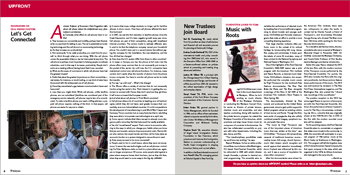HOGENDORN ON CELLPHONE CULTURE
 Assistant Professor of Economics Chris Hogendorn talks about cell phone culture the old-fashioned way, face-to-face in an interview.
Assistant Professor of Economics Chris Hogendorn talks about cell phone culture the old-fashioned way, face-to-face in an interview.
Q. Generally, what effect do cell phones have in our life?
A. They increase our connectivity and mobility, perhaps best illustrated by our penchant for talking in cars. The car is potentially an isolating technology and the cell phone is a reconnecting technology.
Q. Do they increase our productivity?
A. Not necessarily. To be really productive, you need time for yourself, to think through what you are doing. With the cell phone comes the expectation that you can be interrupted at any time. The cell phone is perhaps most important in helping people coordinate schedules?and in that way it increases productivity. People don?t arrive at a meeting without having heard that it was canceled.
Q. What are the areas of commerce in which cell phones have had the greatest impact?
A. Fields that place the greatest importance on client connectivity?real estate, for instance, or stock trading, or any kind of sales have blossomed with the widespread use of cell phones.
Q. Have they exacerbated a gap between communication haves and have-nots?
A. Less than you might think. While cell phones, unlike landline phones, are not subsidized (landlines are considered part of the emergency service network), cell phones require less of a commitment. To order a landline phone, you need a billing address; a prepaid cell phone requires nothing of the kind. In that aspect, cell phones are easier for anyone to obtain.
Q. It seems that many college students no longer opt for landline phones in dorm rooms. How have cell phones affected the landline business?
A. In 2001, we saw the first reduction in landline phones since the Great Depression, and it?s been negative growth every year since. Cell phones are part of their competition, along with broadband Internet providers. The service model is radically different, also. It used to be that the telephone company owned your household phone. You couldn?t even put in a second phone line without paying the company for the installation, the new telephone, and the line. All that has changed.
Q. How does the U.S. system differ from those in other countries?
A. In Japan or Europe, you buy the phone at full cost?but the phone offers many services that do not necessarily put money in the pocket of the carrier. Up until now, the U.S. companies have maintained control over cell phone functions. For instance, many carriers don?t easily allow the transfer of photos from the phone to your computer. You have to use the cell phone carrier to make the transfer.
Q. You say, ?up until now?? What?s the change?
A. The iPhone offers a variety of services that do not necessarily involve using the carrier?s line. Their interest is in getting the customers to connect with iTunes; they don?t care how they get there. It will move us toward the European model.
Q. And what about cell phones in Third World countries?
A. Cell phones allow a lot of countries to leapfrog over old technologies?which they did not have?and greatly increase their connectivity, even over industrialized countries. It?s a bit comparable to the development of manufacturing in post-World War II Japan and Germany. Those countries lost so many factories that in rebuilding they were able to incorporate new technologies at a rapid rate.
Q. Some reports indicate that hikers are apt to attempt more dangerous paths since they feel that help would be readily available.
A. Yes, the ?moral hazard? aspect. That?s a term in economics referring to the ways in which you change your habits when you know that you are insured?and you impose economic costs. Novice hikers who venture into expert terrain and then call for help place an economic burden on a system designed to rescue those in need.
Q. Does everyone want to be more connected?
A. People used to live in small towns, where they were not anonymous. It seems the new technologies such as cell phones?including YouTube, MySpace?take us back to a place where we, again, are no longer anonymous. Of course, some people rebel against a place where everyone knows their business, just as they did then, when they would want to move away to the big city.
